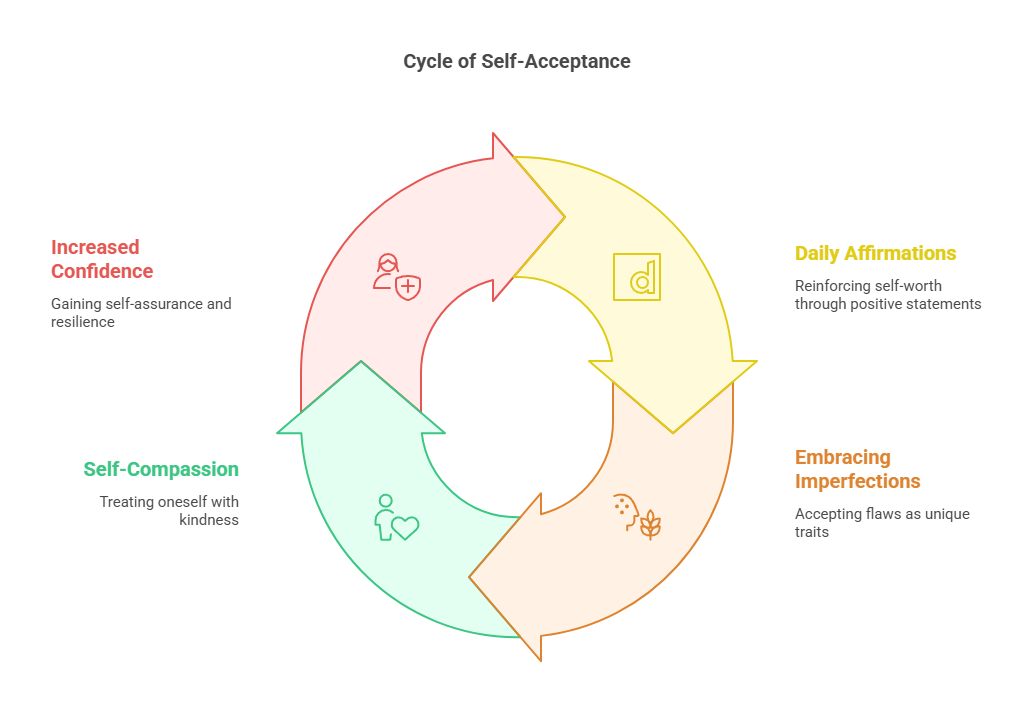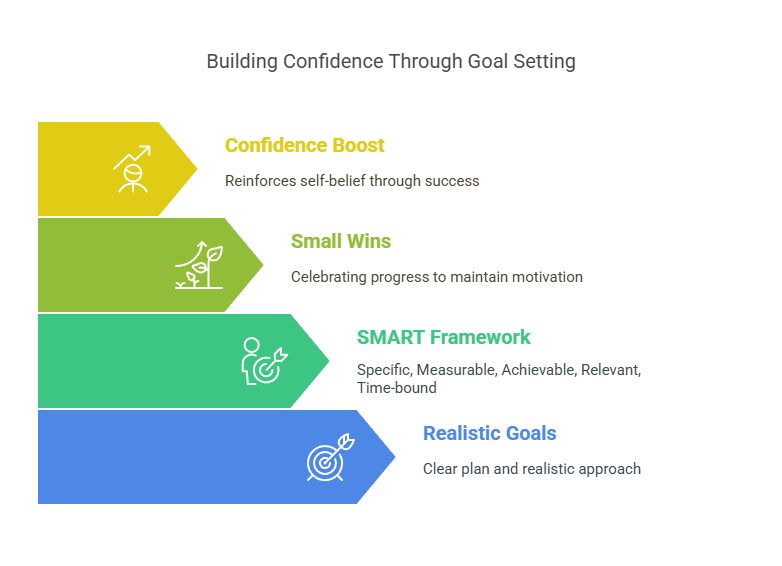Confidence, is the mainstay in the facets of life, it originates and which influences how we interpret ourselves and how others look at us.
However, many of us find it hard to maintain self-confidence and sometimes end up feeling very low no matter how good other things around us might be.
This article looks deeper into the problem of confidence with the help of 7 simple strategies that show you how to raise your self-esteem greatly.
You will get to know about things that will impact your life positively. It is much helpful for those who want to see their interpersonal skills, career development, and self-love, they will find the suggestion that helps them the most to achieve that.
To help you master this concept, we will touch upon the subjects of self-acceptance, goal setting, developing a growth mindset, improving body language, surrounding yourself with the right people, practicing self-care, as well as continuous learning.
Having reached the end of this article, you will have become so knowledgeable in this domain that you will be able to influence positive change in every aspect of your life with much ease.
Strategy 1: Practice Self-Acceptance
Understanding Self-Acceptance
One’s understanding of oneself is a stepping stone that makes one confident.
This means that you are not only aware of your good and bad sides, but have also accepted your flaws and strengths without being biased.
The moment you love yourself, you change the image of yourself to a positive one and this makes you gain confidence. Self-acceptance is not the same as overlooking areas where we need to improve, rather it is the attitude of acknowledging our worth irrespective of our flaws.
Developing a new mindset is vital as the way to our stable self-esteem.
Steps to Practice Self-Acceptance
Self-acceptance is the practice to deliberate intent and regular practice.
Below are some specific measures that could aid in your quest to be the best you that you can be and thus experiencing a greater feeling of self-worth.
Daily Affirmations
Daily affirmations are positive statements that reinforce your self-worth and capabilities. They help rewire your brain to focus on your strengths rather than your shortcomings. Examples of affirmations include:
- “I am worthy of love and respect.”
- “I am capable of achieving my goals.”
- “I embrace my unique qualities.”
Start your day by repeating these affirmations in front of a mirror. Over time, you’ll notice a shift in how you perceive yourself, leading to increased confidence.
Embracing Imperfections
No one is perfect, and that’s okay. Embracing your imperfections is a powerful way to practice self-acceptance. Instead of criticizing yourself for your flaws, view them as part of what makes you unique. For example:
- If you struggle with public speaking, remind yourself that it’s a skill you can improve over time.
- If you make a mistake, treat it as a learning opportunity rather than a reflection of your worth.
By accepting your imperfections, you reduce self-criticism and create space for growth and self-compassion. This shift in perspective is essential for building confidence and resilience.
Unique Insight
One often overlooked aspect of self-acceptance is the role of self-compassion.
Research shows that individuals who practice self-compassion—treating themselves with the same kindness they would offer a friend—are more likely to experience higher self-esteem and confidence.
Incorporating self-compassion exercises, such as writing a letter to yourself during challenging times, can further enhance your journey toward self-acceptance.
By practicing daily affirmations and embracing your imperfections, you lay the groundwork for a confident and resilient mindset.
These strategies not only boost your self-esteem but also empower you to face challenges with a positive outlook.
Strategy 2: Set Realistic Goals
The Role of Goal Setting in Building Confidence
Goal setting is a powerful tool for building confidence because it provides direction, purpose, and a sense of accomplishment. When you set and achieve goals, you prove to yourself that you are capable of success, which reinforces your self-belief. Goals act as stepping stones, helping you break down larger aspirations into manageable tasks. This process not only boosts your confidence but also keeps you motivated and focused on your personal growth journey.
How to Set Achievable Goals
Setting achievable goals requires a clear plan and a realistic approach. Unrealistic or overly ambitious goals can lead to frustration and self-doubt, while well-structured goals foster progress and confidence. Here’s how to set goals that work for you:
SMART Goals Framework
The SMART framework is a proven method for setting effective goals. SMART stands for:
- Specific: Clearly define what you want to achieve. For example, instead of saying, “I want to be healthier,” say, “I want to exercise three times a week.”
- Measurable: Ensure your goal can be tracked. For instance, “I want to save $1,000 in three months” is measurable.
- Achievable: Set goals that are challenging yet realistic. If you’re new to running, aiming for a 5K race is more achievable than a marathon.
- Relevant: Align your goals with your values and long-term objectives. Ask yourself, “Does this goal matter to me?”
- Time-bound: Set a deadline to create urgency and focus. For example, “I want to complete this online course by the end of the month.”
Using the SMART framework ensures your goals are clear, actionable, and aligned with your capabilities, increasing the likelihood of success.
Celebrating Small Wins
Achieving big goals often takes time, and it’s easy to lose motivation along the way. Celebrating small wins keeps you motivated and reinforces your confidence. For example:
- If your goal is to write a book, celebrate finishing each chapter.
- If you’re working on fitness milestones, reward yourself for consistent workouts or hitting a new personal record.
Acknowledging progress, no matter how small, helps you stay positive and reminds you of your capabilities. This practice builds momentum and keeps you committed to your larger objectives.
Strategy 3: Develop a Growth Mindset
What is a Growth Mindset?
A growth mindset is the belief that abilities and intelligence can be developed through dedication and hard work. Coined by psychologist Carol Dweck, this concept contrasts with a fixed mindset, where individuals believe their talents and intelligence are static. Embracing a growth mindset fosters resilience, adaptability, and a love for learning—all of which are essential for building confidence.
Benefits of a Growth Mindset
A growth mindset empowers you to view challenges as opportunities rather than obstacles. It encourages continuous improvement and helps you bounce back from setbacks. Here’s how to cultivate this mindset:
Overcoming Fixed Mindset Traps
Fixed mindset traps include self-doubt, fear of failure, and avoidance of challenges. To overcome these:
- Reframe negative thoughts: Instead of saying, “I’m not good at this,” say, “I’m not good at this yet.”
- Embrace challenges: Step out of your comfort zone and take on tasks that push your limits.
- Seek feedback: Use constructive criticism as a tool for growth rather than a source of discouragement.
Learning from Failure
Failure is an inevitable part of growth. Instead of fearing it, view it as a learning opportunity. For example:
- If you fail a test, analyze what went wrong and create a study plan for improvement.
- If a project doesn’t go as planned, identify lessons learned and apply them to future endeavors.
By adopting a growth mindset, you build resilience and confidence, knowing that every setback is a step toward success.
Strategy 4: Improve Body Language
The Power of Non-Verbal Communication
Body language plays a crucial role in how others perceive you and how you feel about yourself. Confident body language can make you appear more self-assured and can even influence your internal state, a phenomenon known as “embodied cognition.”
Key Body Language Tips
Improving your body language is a simple yet effective way to boost confidence. Here are some actionable tips:
Maintaining Eye Contact
Eye contact signals confidence and engagement. When speaking to others, aim to maintain eye contact for about 60-70% of the conversation. This shows that you’re attentive and self-assured.
Power Posing
Power posing involves adopting open, expansive postures that convey confidence. Research by Amy Cuddy shows that standing in a “power pose” (e.g., hands on hips, chest out) for just two minutes can increase testosterone levels and reduce cortisol, making you feel more confident.
Strategy 5: Surround Yourself with Positive Influences
The Impact of Social Environment on Confidence
The people you surround yourself with can significantly impact your confidence levels. Positive influences encourage and uplift you, while negative ones can drain your energy and self-esteem.
Building a Supportive Network
Creating a supportive network is essential for maintaining confidence. Here’s how to do it:
Identifying Toxic Relationships
Toxic relationships are characterized by negativity, criticism, and lack of support. To identify them:
- Reflect on how you feel after interacting with someone. Do you feel drained or uplifted?
- Set boundaries with individuals who consistently bring you down.
Seeking Mentorship
Mentors provide guidance, encouragement, and valuable insights. Look for mentors who inspire you and align with your goals. They can help you navigate challenges and build confidence through their experience and support.
Strategy 6: Practice Self-Care
The Link Between Self-Care and Confidence
Self-care is essential for maintaining physical, emotional, and mental well-being. When you take care of yourself, you feel better about who you are, which naturally boosts confidence.
Essential Self-Care Practices
Incorporate these self-care practices into your routine to enhance your confidence:
Physical Health
- Exercise regularly: Physical activity releases endorphins, which improve mood and energy levels.
- Eat a balanced diet: Proper nutrition fuels your body and mind.
- Get enough sleep: Rest is crucial for mental clarity and emotional stability.
Mental Health
- Practice mindfulness: Techniques like meditation and deep breathing reduce stress and increase self-awareness.
- Engage in hobbies: Activities you enjoy provide a sense of accomplishment and joy.
Strategy 7: Continuous Learning and Skill Development
The Role of Knowledge in Confidence Building
Continuous learning keeps you updated and confident in your abilities. Acquiring new skills and knowledge not only enhances your competence but also boosts your self-esteem.
Ways to Continuously Learn
Here are some effective ways to keep learning and growing:
Online Courses and Workshops
Platforms like Coursera, Udemy, and LinkedIn Learning offer courses on a wide range of topics. Enroll in courses that align with your interests and career goals.
Reading and Research
Stay informed by reading books, articles, and research papers. This habit not only expands your knowledge but also keeps you intellectually engaged and confident in your expertise.
By implementing these strategies, you can build and maintain confidence in all areas of your life. Each step reinforces your self-belief and empowers you to achieve your goals with resilience and positivity.
Conclusion
Building confidence is a journey that requires self-awareness, effort, and persistence.
By practicing self-acceptance, setting realistic goals, developing a growth mindset, improving body language, surrounding yourself with positive influences, practicing self-care, and continuously learning, you can significantly boost your self-esteem.
Remember, confidence is not about being perfect; it’s about embracing who you are and striving to be the best version of yourself. Start implementing these strategies today and watch your confidence soar.
FAQs
- What is the fastest way to build confidence?
- Practicing self-acceptance and positive affirmations can quickly boost your confidence.
- How does body language affect confidence?
- Confident body language can make you feel more self-assured and influence how others perceive you.
- Can self-care improve confidence?
- Yes, taking care of your physical and mental health is crucial for maintaining confidence.
- What are some examples of growth mindset activities?
- Learning new skills, embracing challenges, and viewing failures as learning opportunities.
- How can I surround myself with positive influences?
- Identify and build relationships with supportive, positive individuals who encourage your growth.






Pingback: How to Be Popular in School